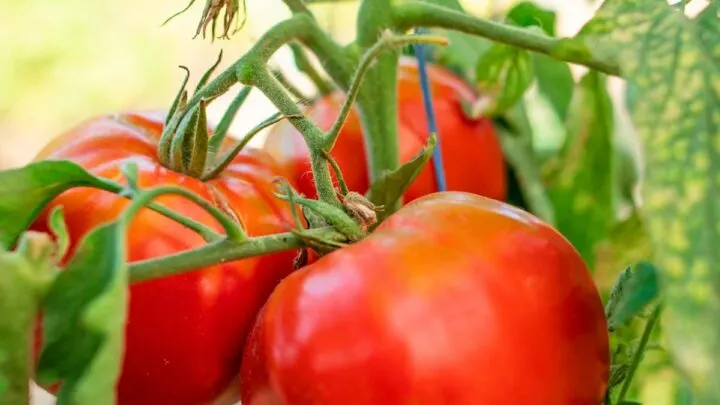Tomato plants are one of the most common vegetables for people to grow at home, but they can also be some of the most irritating.
Like many other vegetables, tomatoes have evolved to have a wide range of protections to keep herbivores from eating them. For instance, like most nightshade vegetables, tomato plants have a lot of irritating and potentially toxic chemicals stored in their leaves and stems but not in their fruits.
The little hairs on tomato plant stems are another common irritant for herbivores.
But what about their human gardeners? Can tomato plants irritate your eyes and the rest of you?
Tomatoes can irritate the eyes. Many of the irritants in tomato plants also affect humans, and they can get in your eyes if you aren’t careful. Reactions are less likely when you’re just standing near tomatoes, but if being near the plants causes itchiness or irritation, that could be a sign of pollen in the air or that you have a slight allergy to something in the tomatoes.
Here’s what you need to know about eye and skin irritation from tomato plants, what it can look like, and what you can do about it.

Are Tomato Plants An Irritant?
Tomato plants can irritate from the rough texture of their leaves and stems. Still, the most common irritation near tomatoes is chemicals and toxins inside the plants.
That’s a relatively technical distinction, but it is an important one. Irritated skin from texture and skin and eyes irritated by chemicals are two very different things and require different treatments.
It’s crucial if you’re struggling with rashes, itchiness, watering eyes, or other problems after being around tomato plants to identify the cause of the problem.
Are your hands itchy and red but not rashy or swollen? That might signal that you need better gardening gloves to protect you from the small hairs on your tomato plants. But if your hands are itchy, red, swollen, or splotchy, that’s more likely to be contact dermatitis, a sign of tomato sensitivity, or an allergic reaction.
Can Tomato Plants Cause Contact Dermatitis?
Yes. Tomato plants can cause contact dermatitis, as can tomato skins in rare cases. However, both are relatively rare according to most medical literature. What’s less clear is whether the contact dermatitis itself is rare or whether it’s just rare for people, including farm workers, to report it.
There are many over-the-counter treatment options for contact dermatitis, which can range from anti-itch creams to topical antihistamines depending on the source of the reaction. However, if your reaction lasts more than an hour or so or is particularly severe, it’s a good idea to consult with a doctor to ensure you aren’t dealing with a more serious issue or allergic reaction.
What Does An Allergic Reaction To A Plant Look Like?
Every allergic reaction is a little different, but most reactions will at least start with redness, itching, maybe forming hives or some bumpy skin, and sometimes splotchiness.
It’s essential to get any allergic reactions checked out by health care professionals, especially if you’ve never had an allergic reaction to tomato plants before.

Can Tomato Plants Cause Allergies?
Yes, people can have allergies to tomato plants, and because tomatoes have evolved to be somewhat irritating and toxic to certain animals, especially herbivores, allergies are relatively common!
There are different types of allergies. For instance, some people allergic to tomato fruits are fine growing tomatoes as long as they don’t sample the product.
Other people must wear more protective gear than usual to work with tomato plants. This is because of the irritating chemicals in tomatoes that can get on your skin and in your eyes.
People with sensitivities and allergies to tomatoes should be particularly careful when the plants are flowering since pollen is often more irritating than other parts of the plant.
Protective equipment ranges from wearing clothing that protects your skin, to thick gardening gloves, to goggles or safety glasses that can help keep your eyes protected.
If you have to take an antihistamine to deal with your tomato allergy symptoms, that may be a sign that you shouldn’t continue growing tomatoes since allergies are likely to get more severe over time.

Can You Be Allergic To Tomato Plants But Not Tomatoes?
Yes! This might seem odd, but many people who enjoy tomatoes and tomato sauces can also be allergic to tomato plants.
There are many reasons for that, but the main thing is that tomatoes are an example of a plant that’s evolved to protect the stem and leaves but also has a fruit that encourages eating. Tomato plants have more irritating chemicals and toxins in their leaves and plants and don’t include those same chemicals in their fruits.
It’s a bit like how hot peppers developed capsaicin to irritate most herbivores, but not birds, so they would still eat the fruit and spread the seeds.
Tomato plants are similar. Animals eating the fruit can spread the seeds around so they can grow in new places, but tomato plants don’t heal or recover from damage very well. Because of that, it’s more important to the plants to protect the stems and leaves and to encourage animals to eat the tomato fruit.
Years of selectively breeding tomatoes to have the traits most desirable to humans have also made tomatoes more palatable and less irritating – so some of the causes of a plant allergy might not be present in the vegetables.
Can You Be Sensitive To Tomatoes?
Yes, like more severe allergies, you can be sensitive to tomatoes. Tomato sensitivity generally comes in two forms, sensitivity to the tomato fruits when you eat them and sensitivity to the tomato plant, including the stems and leaves but usually not the fruits.
You can have both sensitivities, especially if you have a sensitivity to nightshade vegetables in general, but it’s relatively common only to have one sensitivity or the other.
Things To Consider
One thing you should consider if you are worried about working with tomatoes is that personal protective equipment, like gloves and safety glasses or goggles, can go a long way to keeping you safe.
Protective gear, including long sleeves and pants, can also be a good way to prevent an existing sensitivity from getting worse. Often mild sensitivities and allergies are progressive, meaning the problem will worsen each time you react.
So, the more you can do to prevent reactions, the less harmful and bothersome they are likely to become.

Hi there, my name is Allie and welcome to my blog; GareningWithAllie!
Much of what you see written here is just our personal experiences with gardening. Along with the content I write here, there is also a unique collection of gardening topics covered by some of our close friends. I hope you find everything you read here to be helpful, informative, and something that can make your gardening journey the most lovely experience ever! With that said, Happy Gardening!
